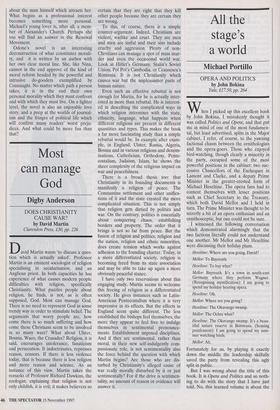Patience on a monument
Sophia Watson
A PERFECT WIFE by Cristina Odone Orion, 116.99, pp. 217 Agovernment is in its sleaze-ridden death throes, the opposition is lying in wait, preparing for its own moment of glory. Rival newspapers, each with their own agenda, report unfolding events as best suits them. Meanwhile the movers and shakers must continue, and come to terms with, their own lives.
Nina, the perfect wife of the title, is mother of one slightly feeble son and wife to Michael Lewis, the not remotely feeble deputy editor of the Sunday Herald. She is beautiful and loyal, a soulmate, cook and helpmeet to her husband, and even has her own career as a columnist on Society. They make the perfect glittering media couple, but she does have a secret. This is that she loves her husband with a blind, gripping passion, a passion of which even he must (in her view) be kept unaware. This could be deeply moving, but seems more a superb post-feminist joke in the days when wifely secrets are more often other men (or women), or foul habits. And while she hides her love for her husband for fear of suffocating him, he is driven by her cool, wifely affection into the arms of an adoring and plain young colleague. These are the confusions of emotional need in a life lived on the surface.
This plot forms the bones onto which the meat of the main theme is hung. For into this world of self-interest and double standards steps the charismatic Alexander Connaught, the young and very handsome vicar who heads the Renewal Movement. This movement is all Old Major hopes for — a family-oriented society glossed with New Labour lips, teeth and charm. And it works. Its converts number not only the lost young souls who will attach themselves to any new passing craze but ambitious politicians and the reformed serial adulter- ess Lady Katherine Stevenson, whose husband owns the Daily and Sunday Heralds.
Nina, like all nicely brought up Catholic girls, is at first deeply suspicious of Alexan- der's evangelistic brand of Christianity. She finds his services embarrassing more than moving, but inevitably there is something about the man himself which attracts her. What begins as a professional interest becomes something more personal. Michael's young lover is, after all, a mem- ber of Alexander's Church. Perhaps she too will find an answer in the Renewal Movement.
Odone's novel is an interesting deconstruction of what constitutes morali- ty, and it is written by an author with her own clear moral line. She, like Nina, cannot in the end approve of the kind of moral reform headed by the powerful and intrusive do-gooders exemplified by Connaught. No matter which path a person takes, it is in the end their own personal morality which they must confront and with which they must live. On a lighter level, the novel is also an enjoyable love story, and a peep at the worlds of journal- ism and the fringes of political life which will confirm many readers' worst preju- dices. And what could be more fun than that?











































































 Previous page
Previous page